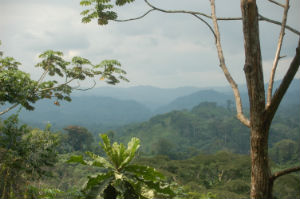Research shows effects of climate change on plant life could be seen within 35 years
Release Date 03 November 2016

Climate change could bring about a significant redistribution of plants on Earth by the year 2050, new research has revealed.
Scientists looked at fossilised plant pollen from 20,000 years ago, when the planet's ice sheets were melting due to climate change, to shed light on what may happen to plant life during future temperature increases expected to occur this century.
The study published in Nature, led by the University of Copenhagen and supported by the University of Reading and others, predicts many plant species will soon be seen in other parts of the world while others in America and Europe could disappear.
Dr Joy Singarayer, who carried out climate modelling for the study, said: "Our research shows that future generations will be surrounded by a very different landscape than we are today - and these changes will be seen this century.
"By looking at fossilised pollen, we are able to effectively travel back in time to see how plant life changes as global temperatures rise, as they are predicted to in the coming decades.
"It will be interesting to see how other factors like landscape fragmentation due to human land use and invasive species will add to, and interact with, climate change pressures to bring about changes to the environment as we know it."
On the verge of a global reshuffle
The prediction is based on records of fossilized pollen from plants that lived between 20,000 years ago to present. During this time, global temperatures rose by 4 to 5 degrees, similar to the temperature rises expected for this century.
The records of pollen used in the study comprised 100 European plant taxa from 546 sites, and 87 North American plant taxa from 527 sites. The study shows that one third of North American plants and more than half of European plants may face increased threat status in the future due to climate change. Central North America and southern Europe are the most exposed regions.
Lead-author of the study, Associate Professor David Nogués-Bravo from Center for Macroecology, Evolution and Climate at the Natural History Museum of Copenhagen, said: "It means that our own grandchildren will encounter largely different landscapes compared to those we know today.
"They will see new species in forests, on prairies and scrublands, while other species, that are common in those areas today, will be gone."
The findings of the study, based on paleorecords, highlight the vital importance of biological archives like those at Natural History Museums, Botanical Gardens and digital internet databases. They provide conservation assessments to inform the conservation policies of today and in the future.
This study is another example of the kind of world-leading research carried out at the University of Reading - and people in the local region now have the opportunity to get involved in this research, by studying for a doctoral degree to help further their career prospects.
The University provides full bursaries for 15 PhD students from the Reading region every year. The students will be involved in world-class research projects in any subject at the University, and can study full-time, or part-time while still working.
Full details about the scheme for 2017 are available at: http://www.reading.ac.uk/graduateschool/prospectivestudents/gs-regionalphdbursary.aspx
D. Nogués-Bravo, S. Veloz, B. G. Holt, J. Singarayer, P. Valdes, B. Davis, S. C. Brewer, J. W. Williams and C. Rahbek (2016). ‘Amplified plant turnover in response to climate change forecast by Late Quaternary records'. Nature. Doi: 10.1038/nclimate3146.